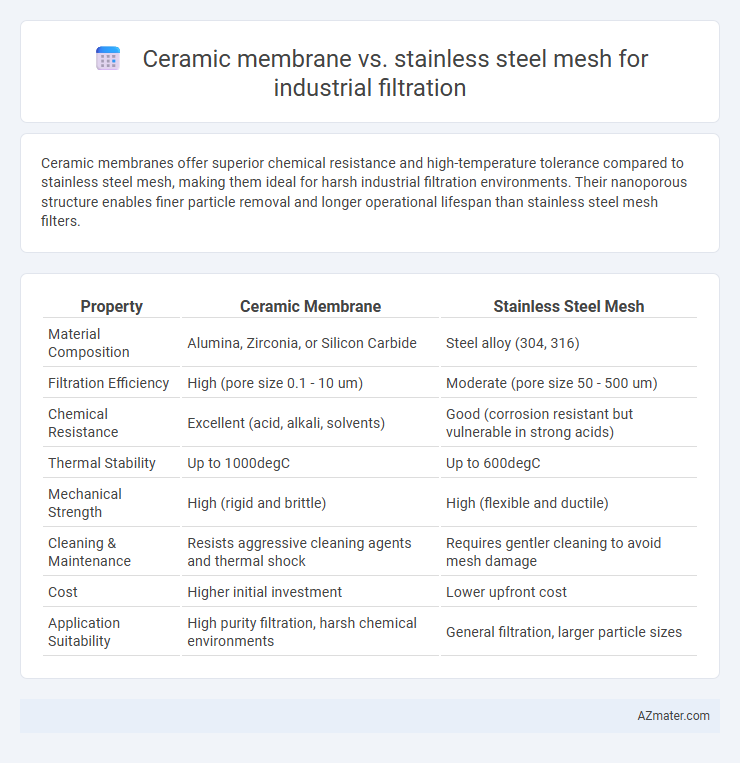Ceramic membranes offer superior chemical resistance and high-temperature tolerance compared to stainless steel mesh, making them ideal for harsh industrial filtration environments. Their nanoporous structure enables finer particle removal and longer operational lifespan than stainless steel mesh filters.
Table of Comparison
| Property | Ceramic Membrane | Stainless Steel Mesh |
|---|---|---|
| Material Composition | Alumina, Zirconia, or Silicon Carbide | Steel alloy (304, 316) |
| Filtration Efficiency | High (pore size 0.1 - 10 um) | Moderate (pore size 50 - 500 um) |
| Chemical Resistance | Excellent (acid, alkali, solvents) | Good (corrosion resistant but vulnerable in strong acids) |
| Thermal Stability | Up to 1000degC | Up to 600degC |
| Mechanical Strength | High (rigid and brittle) | High (flexible and ductile) |
| Cleaning & Maintenance | Resists aggressive cleaning agents and thermal shock | Requires gentler cleaning to avoid mesh damage |
| Cost | Higher initial investment | Lower upfront cost |
| Application Suitability | High purity filtration, harsh chemical environments | General filtration, larger particle sizes |
Introduction to Industrial Filtration Technologies
Ceramic membranes offer superior chemical resistance, thermal stability, and precise pore size control compared to stainless steel mesh, making them ideal for high-temperature and aggressive chemical industrial filtration processes. Stainless steel mesh provides cost-effective, durable filtration with high mechanical strength but lacks the fine filtration capabilities and long-term corrosion resistance of ceramic membranes. Industrial filtration technologies increasingly favor ceramic membranes for applications requiring stringent purity and separation efficiency in sectors such as pharmaceuticals, food processing, and wastewater treatment.
Overview of Ceramic Membranes
Ceramic membranes offer superior chemical resistance, thermal stability, and durability compared to stainless steel mesh, making them ideal for harsh industrial filtration environments. Their precise pore size distribution enables efficient separation of fine particulates, emulsions, and microorganisms in applications such as wastewater treatment and food processing. Unlike stainless steel mesh, ceramic membranes resist corrosion and fouling, reducing maintenance costs and extending operational lifespan.
Characteristics of Stainless Steel Mesh Filters
Stainless steel mesh filters for industrial filtration offer excellent mechanical strength, high temperature resistance, and chemical durability, making them suitable for harsh processing environments. Their corrosion-resistant properties ensure longevity and reliability in applications involving abrasive or corrosive fluids. With customizable pore sizes and mesh configurations, these filters provide efficient particulate removal while maintaining high flow rates and easy cleaning.
Filtration Efficiency: Ceramic vs Stainless Steel
Ceramic membranes exhibit superior filtration efficiency compared to stainless steel mesh due to their uniform pore size distribution and high chemical resistance, enabling precise removal of fine particles and contaminants. Stainless steel mesh tends to have larger pore sizes and lower selectivity, resulting in less effective separation of microscale impurities in industrial filtration applications. The enhanced durability and fouling resistance of ceramic membranes contribute to longer operational life and consistent filtration performance under harsh industrial conditions.
Chemical and Thermal Resistance Comparison
Ceramic membranes exhibit superior chemical resistance against acids, alkalis, and aggressive solvents compared to stainless steel mesh, which can corrode under harsh chemical exposure. Thermal stability of ceramic membranes extends beyond 1000degC, making them ideal for high-temperature industrial processes, whereas stainless steel mesh typically withstands temperatures up to 800degC before losing mechanical integrity. The enhanced resistance of ceramic membranes results in longer service life and reduced maintenance costs in chemical and thermal intensive filtration applications.
Durability and Lifespan Evaluation
Ceramic membranes offer superior durability and longer lifespan compared to stainless steel mesh, with resistance to high temperatures, chemical corrosion, and abrasion, making them ideal for harsh industrial filtration environments. Stainless steel mesh, while robust against mechanical stress, tends to degrade faster due to corrosion and wear under extreme chemical conditions, requiring more frequent replacement. The extended operational life of ceramic membranes significantly reduces maintenance costs and downtime in industrial filtration systems.
Maintenance and Cleaning Requirements
Ceramic membranes offer superior chemical and thermal resistance, allowing for aggressive cleaning protocols such as backflushing and chemical cleaning without deterioration, which significantly reduces downtime and maintenance frequency in industrial filtration. Stainless steel mesh requires more frequent manual cleaning and is susceptible to clogging, corrosion, and deformation under harsh cleaning conditions, increasing maintenance costs and operational interruptions. The durability and fouling resistance of ceramic membranes provide longer service life and consistent filtration performance, making them more cost-effective in high-demand industrial environments.
Cost Analysis: Initial Investment and Long-term Savings
Ceramic membranes generally require a higher initial investment than stainless steel mesh due to advanced materials and manufacturing processes, but they offer superior durability and longevity, reducing replacement frequency over time. Stainless steel mesh features lower upfront costs but demands more frequent maintenance and replacement, increasing operational expenses in the long run. Industrial filtration systems using ceramic membranes achieve significant long-term savings through enhanced chemical resistance and thermal stability, minimizing downtime and associated costs.
Application Suitability in Various Industries
Ceramic membranes excel in harsh industrial filtration applications such as chemical processing, food and beverage, and wastewater treatment due to their high chemical resistance, thermal stability, and fine pore structure enabling precise particle separation. Stainless steel mesh suits industries requiring robust mechanical strength and high flow rates, like oil and gas, automotive, and pulp and paper, effectively filtering larger particulates under high pressure and abrasive conditions. Selecting between ceramic membranes and stainless steel mesh depends on the need for fine filtration and chemical durability versus cost-effective, heavy-duty filtration with greater mechanical resilience.
Environmental Impact and Sustainability Considerations
Ceramic membranes offer superior chemical resistance and thermal stability, enabling longer operational lifespan and reduced waste compared to stainless steel mesh, which is prone to corrosion and frequent replacement. The energy efficiency of ceramic membranes, owing to their finer pore size and higher filtration precision, contributes to lower carbon emissions in industrial filtration processes. Although stainless steel mesh is recyclable, the environmental cost of frequent maintenance and shorter service life makes ceramic membranes a more sustainable choice for industrial applications focused on minimizing environmental impact.

Infographic: Ceramic membrane vs Stainless steel mesh for Industrial filtration
 azmater.com
azmater.com